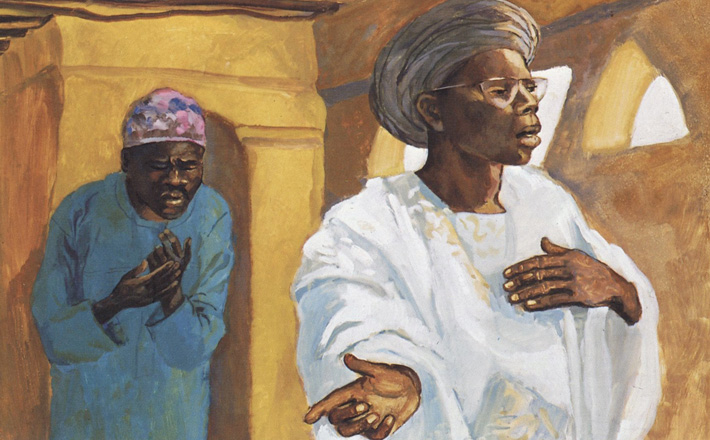Commentary on Joel 2:23-32
Joel 2 is, perhaps, most well known from its quotation in Acts 2:14 and following.
In Acts, Peter calls upon Joel’s words to help the festival crowds in Jerusalem understand the powerful in-rushing of the Holy Spirit that would come to define Pentecost thereafter. For many it will be difficult to separate Joel from its New Testament context, but Joel can still speak for himself (or for God-self as it were) in two striking ways.
The first striking thing Joel does — which is what Peter is seizing upon in Acts — is make a promise. God promises the return of the divine spirit — a return of prophecy — after a long silence-of-the-spirit. This actually comes at the end of our reading, after God has called upon to the people to be glad and rejoice (2:23). The reason for this cause for celebration is that a longed for change is coming.
Psalm 74, which was most likely written during the exilic period, recalls the silence of God, the eerie absence of the prophetic voice:
We do not see our emblems;
there is no longer any prophet,
and there is no one among us who knows how long. (Psalm 74:9)
For a generation at least God’s spirit has sent no visions, whispered no oracle — either of judgment or hope — into the slumbering prophet’s ear; God’s spirit and voice have been absent. But no more. Going back just a few verses from the beginning of this reading, we find the promise of restoration powered by the outpouring of God’s spirit, addressed to an expectant Israel:
I am sending you grain, wine, and oil, and you will be satisfied.
I will remove the northern army far from you…. (2:18, 19).
In other words, Israel will return to its land; restoration is in the offing. The prophetic vision of a return, or a relenting in punishment, of a sentence served, is the vision of the Return from Exile, ushered in by the outpouring of God’s Spirit (Joel 2:29). This renewal of the prophetic voice, enabled by God’s Spirit, is the first way one ought to read Joel 2, and that may in turn shed light on just how the miracle of Pentecost is to be understood.
But of course this outpouring is remarkable not only in the sense that it is a shift from God’s silence, but in its scope as well. The spirit is to be poured out “on all flesh” (2:28). While this oracle is clearly addressed to Israel (see 2:23, 27; “Zion” and “Israel” are both spoken to directly), that the spirit is poured out on all flesh is striking. Is the spirit only for Israel, or is it for all humankind? It is a radical idea.
As John Barton concludes of this passage:
“Yet it is difficult to see just what would be implied by an extension of the outpouring of YHWH’s spirit beyond the bounds of Judah, which would make this prophesy one of the most ‘universalistic’ in the Old Testament.”1
It cannot be argued that this is precisely how the book of Acts then takes Joel to be meant. And for the present audiences the Old Testament word is best understood in a way similar to the New Testament application of it.
A second striking element of Joel is its use of exodus-imagery to convey the promise of a restoration for Israel. Joel 2:23-32 is replete with imagery redolent of the exodus (see also Exodus 6:7, 7:5; 14:4, etc.):
Joel 2:27: “You shall know that I am in the midst of Israel … that I, the Lord, am your God.”
Verses 26 and 30: The words translated “wondrously” and “portents” are from the same root word in Hebrew (pela), the same word used for the “plagues” or “wonders” of the exodus event.
Verse 23: “Rain” is used three times leading into a description in verse 24 of threshing floors “full of grain,” and overflowing vats of wine and oil. This may call to mind Exodus 16:4 (among other passages) which speak of God raining bread upon the people so that they have more than enough.
Like Jeremiah (but without his bold claim that the Restoration will eclipse the exodus; see Jeremiah 16:14-15; 23:7-8), Joel thinks of the Restoration as a sort of new exodus. And as such, the promise of Joel may be just as immediate, just as powerful for us in the here and now. Not only was Joel speaking of a restoration of his own people; and not only was Joel appropriated to speak to the time of the early church; but Joel is speaking of, imagining, promising a new restoration, a new exodus for God’s people now, today.
The question we may wish to ask in our preaching and teaching this week is, “What is our God calling us out of ‘exile’ to do and be in a new ‘promised land’?”
1 John Barton, Joel and Obadiah [O.T.L.], Louisville, Ky.: Westminster John Knox Press [2001], 96.


October 27, 2013